The Lamborghini showroom and a Tiffany branch sit at either end of Baku’s long boulevards beside the Caspian Sea. Adorned with grand 19th-century mansions, all plaster nymphs and columned facades, that were built by the first oil millionaires, they are a testament to the enduring power of fossil fuels. Oil has been very good to Azerbaijan.
It flows out of the ground here, and gas has seeped out, ignited and burned naturally in the area for so long that the country’s symbol is a flame and its nickname is the Land of Fire. Baku was the world’s first oil town, with wells exploited as early as the 1840s. Ilham Aliyev, the autocratic president, calls oil and gas “the gift of God” to his people. They represent 90% of Azerbaijan’s exports.
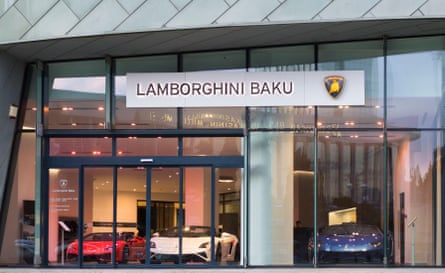
Early on Sunday morning, ministers and high-ranking officials from nearly 200 countries gathered in Baku’s Olympic stadium to witness the drama of fossil fuel wealth battling with science, which says that continuing to burn oil, gas and coal will bring havoc and destruction to the planet if temperatures are not limited to a rise of 1.5C above preindustrial levels. Most observers would say that science lost.
“[The goal of limiting global heating to] 1.5C was at the ICU. It feels like that bed just broke,” said Juan Carlos Monterrey, Panama’s climate envoy, standing outside the hall in which the final meeting of the Cop29 climate summit had just ended.
“This very low level of finance … means death and misery for our countries.”
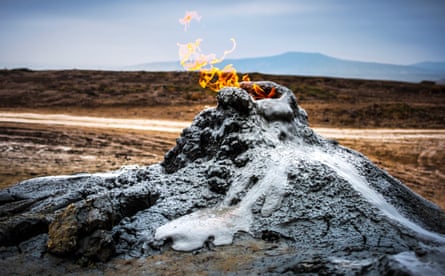
At stake in Baku was the money needed to help poor countries shift to a low-carbon economy and adapt their infrastructure to the impacts of extreme weather. About $1.3tn (£1tn) a year will be needed by 2035 for countries to achieve this, and for the world to stay within the 1.5C limit.
A deal on how to get some way to reaching that target was struck in that hall, but it was one so hedged, loose and half-hearted that many cried betrayal. Representatives of the least developed countries (LDCs) negotiating bloc said: “[We are] outraged and deeply hurt by the outcome of Cop29. Once again, the countries most responsible for the climate crisis have failed us. This is not just a failure. It’s a betrayal.”
Only $300bn of the promised total will come directly from the budgets of developed countries and public finance institutions, such as the World Bank. The great majority of that money should be in the form of grants and low-interest loans, but loose wording means even that commitment is hedged – the cash could come from “a wide variety of sources, public and private, bilateral and multilateral and alternative sources”.
The remainder of the $1.3tn will have to come largely from private sector investment in developing countries, with an unspecified amount also supposed to come from potential new levies on shipping, frequent flyers, oil and gas and other sources. The latter have yet to be agreed, however, and could be difficult to achieve in practice.
“People of the global south came to these talks needing a lifeboat out of the climate crisis. But all they got was a plank of wood to cling to,” said Mariana Paoli, global advocacy lead for the Christian Aid charity.
Yet rich countries said the deal was as much as they could deliver. “Developed countries have gone quite a long way to try and find a way through this, and at a time when public finances really are stretched,” said Ed Miliband, the UK’s energy secretary.
Cop29 opened on 11 November. Five days before, Donald Trump was reelected as president of the US on a platform that gave no doubt he would resume the US withdrawal from the Paris climate agreement, ditch climate action and “drill, baby, drill”.
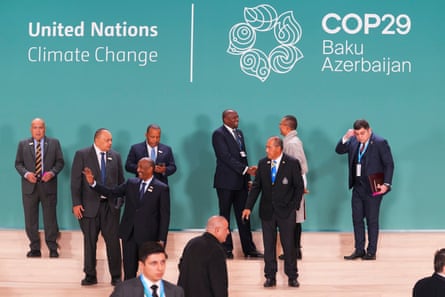
Baku also marked the first time a Cop had dealt properly with finance. The only previous financial goal – for developed countries to ensure that $100bn flowed to the developing world each year by 2020 – was set in 2009, without any real discussion. Cops are normally the work of environment or foreign ministries, rather than finance departments, so parties arrived in Baku with no template for how a finance discussion should work. One veteran complained: “Too many delegates have no idea how finance works – and didn’t bring people who do.”
This lack of a blueprint for discussions led to an overreliance on the presidency, with many countries looking to Azerbaijan to lead. But Mukhtar Babayev, Azerbaijan’s environment minister, in the role of president, saw his role as convener instead. As the talks wore on into their second week, this clash of outlook became increasingly problematic.
“The presidency was not there, not available, at key moments,” one delegate said. “They asked for pieces of work to be done by parties, then ignored them,” said another. “They held meetings with no clear agenda,” said a third.
Babayev takes a different view. He believes the developed countries made a poor decision early on, by failing to put a clear offer of finance on the table. Without a set of numbers, meaningful discussions were impossible. “We were quite frustrated that the developed countries had not put forward a number much sooner,” said Michai Robertson, adviser to the Alliance of Small Island States (Aosis).
By the second Thursday – the penultimate day – of the talks, the situation reached a crisis. That morning, the presidency issued a draft text of an agreement – but where all the important numbers should have been, there was only an X.
Countries and campaigners were scathing. Oscar Soria, a director at the Common Initiative thinktank, said: “The negotiating placeholder ‘X’ for climate finance is a testament of the ineptitude from rich nations and emerging economies that are failing to find a workable solution for everyone.”
But if the X text appeared farcical to many, what followed was even worse. Developed countries were presented with a text to which they were willing to put a number – and they put forward one that was deliberately low. The second iteration of the draft gave a number of $250bn, even though countries were widely primed to expect $300bn. The Guardian had it privately confirmed by developed countries on the eve of the talks that a tripling of the $100bn goal – albeit not accounting for inflation – was likely to be the offer.
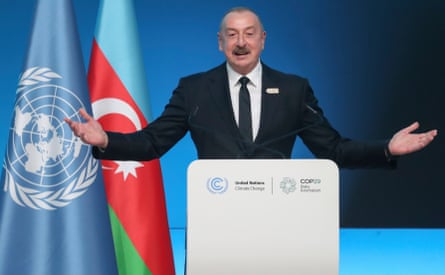
While the tactic of opening with a lowball offer might be common practice in financial negotiations from housebuying to horse-trading, at Cop it ignited fury. Climate breakdown is an existential issue for poor countries, and here they were, being played.
“This is a slap in the face,” said Mohamed Adow, a cofounder of the thinktank Power Shift Africa. “No developing country will fall for this. It’s not clear what kind of trick the presidency is trying to pull. They’ve already disappointed everyone, but they have now angered and offended the developing world.”
By midnight on Friday, the palpable tension in the negotiating rooms made it clear the ruse had backfired. At an emergency meeting at 7am on Saturday, the EU, the US, the UK, Australia and a few others sat down to take bleary-eyed stock. Countries were urged to come out with their final offers. The figure of $300bn was agreed and relayed to the presidency.
From then it was clear that the talks were going to run at least all day. “We were very nervous that there would not be a deal,” one presidency source said.
Protesters lined up outside the hall to tell negotiators “no deal is better than a bad deal”. Frustrated by what they saw as their needs being ignored, delegates from Aosis and the LDCs negotiating blocs walked out of a key meeting, late on Saturday afternoon. It looked as if the talks might collapse in a manner similar to Cop15 in Copenhagen in 2009, which descended into mayhem at about the same stage.
Frantic diplomacy now took place behind the scenes. Negotiators holed up in meeting rooms, while other delegates rushed between country offices, trying to find common ground. Plenary meetings were called, then abandoned. Rumours of new texts flew about the conference centre, and deadlines for the issue of new drafts came and went.
Late on Saturday evening, Babayev took to the stage for a plenary session, to the puzzlement of observers, as it was clear there was no deal in the offing. Instead, he gavelled through a set of inconsequential measures, then left the stage. The sense of talks spiralling out of control took hold.
While most of the focus was on the finance deal, one key element of Cop29 was also missing. At Cop28, countries had committed – for the first time – to “transition away from fossil fuels”. That hard-won resolution, which had the support of a large majority of both developed and developing countries, was in danger at Cop29. Saudi Arabia came to the conference determined to unpick the commitment. The country played an openly obstructive role in meeting after meeting, delegates from many countries said privately. Each attempt to include the commitment, from the setting of the agenda as the Cop opened, to the negotiations late on Saturday night, was met with intransigence or even attempts at subversion.
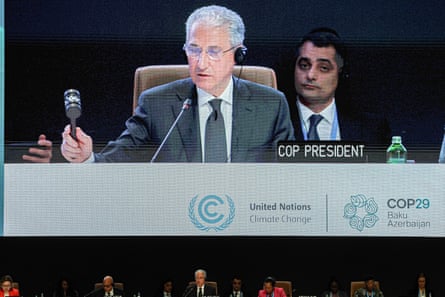
In one extraordinary development, the Guardian revealed that a Saudi delegate had been accused of editing a piece of text without full consultation, leading to outrage among delegates and campaigners.
Nations fought Saudi Arabia to retain crucial wording that would have allowed a version – rather weaker than many had hoped, but still workable – of the commitment to transition away from fossil fuels to stay in. That text was put to one side, to the relief of supporters.
By 11pm on Saturday, the signs of delegates having barely slept for days was showing. Ministers stared out of red eyes at text, officials swayed slightly as they scrolled through their smartphones in corridors, and the queues outside the remaining coffee outlets lengthened. Workers arrived to start dismantling parts of the conference centre. The stark truth was finally clear. Delegates had a choice between going home without a deal – and therefore no promise of money – and returning to the same negotiations next year, with Trump as US president. Or they could accept the offer that was on the table.
Around midnight, delegates started gathering in the plenary room. Miliband could be glimpsed deep in conversation with US official Sue Biniaz. EU representatives rushed in. Aosis nations and the LDCs started to gather. Panama’s Monterrey, with his distinctive hat, was chatting to fellow Latin American delegations.
Babayev started to speak – and then, just as abruptly, adjourned. Delegates stayed in the hall. It was clear a deal was close, but not yet settled.
India, the world’s third biggest emitter and fifth biggest economy, has played an important role in many Cops, and prides itself on sticking up for the developing world – and has held up agreements at several previous Cops for this reason. Both an enthusiastic advocate of renewable energy and a heavy user of coal, it can sometimes appear stuck between fossil fuels and a clean-tech future.
While China wanted a deal at Cop29, according to many insiders, India was more ambivalent. The country wanted to be able to benefit from climate finance to bolster its transition to a clean economy, but it also wanted developed countries to pay far more than had been offered.
Indu Murthy, a director at the Centre for Study of Science, Technology and Policy in India, said before the final stages: “India will most likely not want to make any compromises as India’s stand and demand are valid and justifiable. This stems from the fact that India is grappling with the adverse impacts of climate change, which have implications for lives, livelihoods, and the economy. Developed countries demanding ramping up of ambition by developing countries are continuing to consume the remaining carbon budget.”
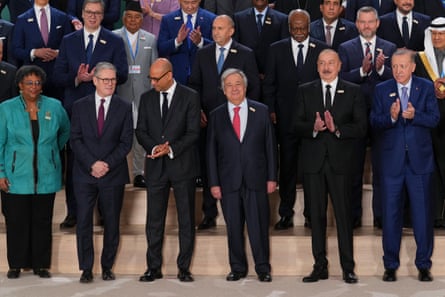
Throughout the Cop, India had raised no objections to the climate finance deal, according to one source. “They had every opportunity, but they went through every meeting without raising objections,” said the source.
As the clock ticked on, delegations from several countries tried to talk both to the Indian delegation in Baku, and on hotlines to the central government in Delhi. India’s ally China made such calls; so did the United Arab Emirates, host of last year’s Cop, according to several sources; and even Saudi Arabia, according to one source.
India’s objection was to the wording of a paragraph on multilateral development banks. The country wanted assurances over how its potential contributions to the banks would be treated in climate finance terms. Delhi would have an opt-out, the team was told. That seemed to be enough.
Yalchin Rafiyev, lead negotiator for Azerbaijan, said he understood then that India was agreeing to the final deal, and it was gavelled through. “They did not object. They were requesting a statement from the floor, not an objection,” he said.
India did not see it that way. Chandni Raini, the country’s chief negotiator, afterwards accused Azerbaijan of “stage managing” the talks and decried the outcome as a “travesty of justice”.
Some insiders speculated that India was having it both ways – not preventing a deal, but registering afterwards its dislike.
In the confusion that followed, just as the developed countries were beginning to celebrate having got a deal through, there was another final twist to Cop29. The part of the agreement dealing with the transition away from fossil fuels had been rejected. It was postponed until next year.
Just after 5am, the extraordinary Cop29 conference ended. Almost no one was left satisfied – the developed countries lost their “transition away from fossil fuels”; the developing world had a deal that was described as a “betrayal” and a failure.
Some key decisions will have to wait for next year, when Cop30 will take place in Belém. Brazil was already facing one of the toughest Cops ever, as it will be the last chance for countries to come forward with new national plans on cutting emissions, in line with the 1.5C target. Now next year’s conference will take place with the bitter taste of recrimination from Baku, and in the shadow of Trump’s White House. “Piling all of this on to Brazil is just a nightmare,” said Claudio Angelo, of the Observatório do Clima.
After all the divisions revealed over the past fortnight, the irony is that nearly every country gathered in Baku acknowledged that climate finance for the poor world was good for the whole planet. As António Guterres, the UN secretary-general, put it: “The world must pay up, or humanity will pay the price. Climate finance is not charity, it’s an investment.”

.png) 1 month ago
13
1 month ago
13













































